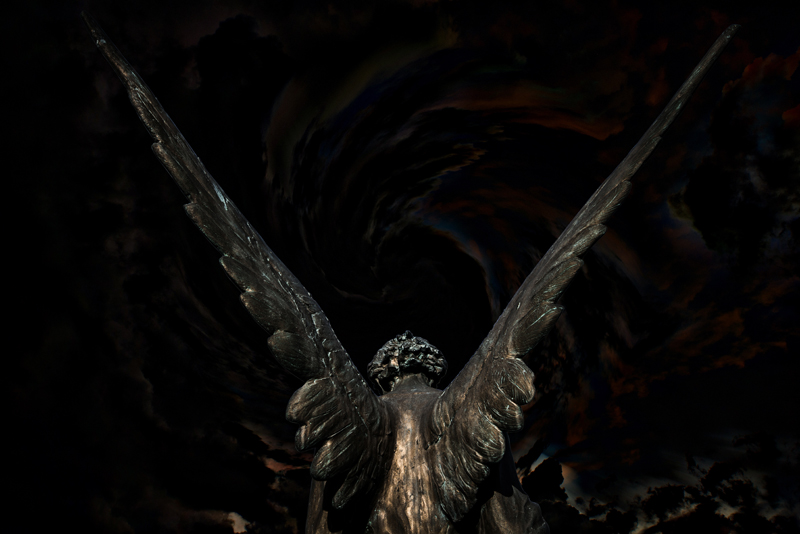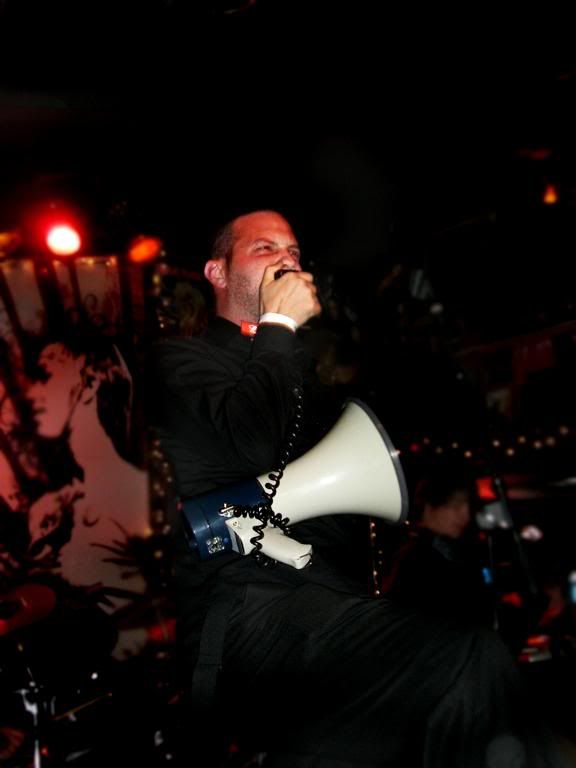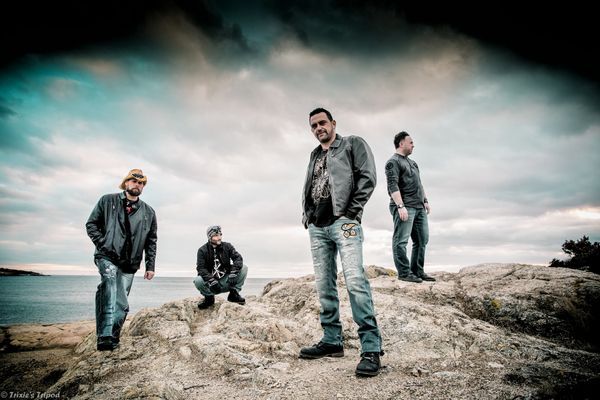Interview - Ana Kefr - Fourth instalment

Morley: A number of your lyrics contain an anger towards the actions of some people belonging to several different races. In “The Day that Guilt Turned White”, you speak negatively about Affirmative Action, as well as the connections between Native Americans and casinos. Malcolm X is singled out as well. Would you care to explain the rationale behind your statements?
Rhiis: The term "reverse racism" seems to be a good starting point, especially considering the recent confirmation of Associate [In-]Justice Sonia Sotomayor to the United States Supreme Court. Reverse racism - or "benign discrimination," possibly one of the greatest wordf*cks in history - is discrimination against members of a dominant majority to promote members of a minority. In short, it's regular racism repackaged and sold to minorities at a cheaper cost, and apparently everyone's buying it.
"Hypocrisy" is a small word when I claim to desire equal opportunities for all and then, because I am both part Cherokee and a Lopez, demand grants and scholarships for being non-white. In 2003, the Supreme Court ruled to allow the consideration of race as a factor in the admittance of university students, an example of Affirmative Action. In the abolition of prejudiced thought, race shouldn't even be allowed into the picture. In the name of so-called freedom, a partial wall of apartheid is established by law between ethnicities, and this wall is erected by the hands of self-pity, an inexplicable sense of entitlement and, above all, greed. By sanctifying such a backwards mentality, we spread wide the gates to a whole host of new stupidities.


If someone was paid by the government, given scholarship money, free health care and sometimes housing, all for being white, Native Americans - and all other non-whites - would be outraged. Yet the reverse is the norm. Today's generations should not have to atone or pay for mistakes they had no hand in. African Americans calling one another "nigger" is as atrocious as the idea of a Jew referring to his friend as an "Auschwitzer," and honoring figures like Malcolm X - who taught, among other idiocies, that white people are devils created by an evil Jewish scientist - betrays their vulgarity.
I, nor anyone else I know, has or ever would consider enslaving another human being, let alone look down upon differing ethnicities as inferior. Whatever resentment may exist is simply not our problem.
Morley: “T.ruthless” paints a less than generous picture of organized religion. Are you speaking about all religions or singling out any in particular?
Rhiis: "T.ruthless" is about all religious faith and, more specifically, the backward priorities and irresponsibility engendered by such convictions. To the possessed-of-faith, the small stuff seems to be more important than real concerns - it is more important to wear a veil, to have payot (sidelocks), to refrain from eating pork, to fit into the flock, than to think for oneself or be happy or consider women as more than legal property. The list goes on. I'd always wondered where religion's ability to divide and conquer responsibility sprang from, not only between differing beliefs but between members of the same faith. I think the answer to this comes in the form of a question: what happens to a person's accountability to others when the forgiveness and pardon for real earthly offense is placed beyond humanity? If I have harmed my brother, why would I seek forgiveness from someone else besides him, let alone God? It is this all-pervasive mentality that solves nothing, erecting psychological walls by removing person-to-person accountability and injecting God between the two. But this is just one of many reasons I find religious faith to be vile.
Morley: You say that you grew up in a very “religious and oppressive environment”. Can you elaborate?
Rhiis: While some may opine that it would be wrong to openly hang the offenses of my parents on a line for the world to examine, I believe it would be total hypocrisy, considering my usual hypercritical perspective, to draw a protective veil around them and distance anything from criticism. Though I desire to protect children from the kinds of experiences I've had, it is important to note that I am nevertheless thankful for all of the events and influences that have made me what I am. A glance at my youth can sometimes explain a lot about the present, so I give two examples. When I was 8 years old, my mother brought me to participate in abortion clinic protests. Imagine, if you will, a wide-eyed, curly-haired little boy holding up a cardboard sign, on which is an enlarged photograph of a gored, mutilated fetus. That was my childhood. And many of us have heard the Biblical story of Abraham, upon God's demand, nearly sacrificing his son, Isaac. Such stories disturb children. Understanding the implications of my parents' faith, I asked what would happen if God asked for my sacrifice. What do you think their response was? A fair portion of my childhood crawled beneath the terror of becoming the "God of Love's" living sacrifice. In all irony, my parents made good their commitment to God - they sacrificed my childhood on the altar of faith.
Morley: “Avenue of the Queen” and “The Orchid” are part of a two-song cycle. Care to explain what they are about?
Rhiis: Most of the lyrics I write tend to be pretty self-explanatory, it usually doesn't take a whole lot to figure out what point I am making. With "Avenue of the Queen," and "The Orchid," I took a more vulnerable and emotional approach to writing, and I feel that part of the beauty of art is sometimes its mystery. I would prefer that people interpret these songs for themselves, to let the music speak to their emotions instead of a cold explanation.
Look below for the next link to this 7-part interview
Rhiis: The term "reverse racism" seems to be a good starting point, especially considering the recent confirmation of Associate [In-]Justice Sonia Sotomayor to the United States Supreme Court. Reverse racism - or "benign discrimination," possibly one of the greatest wordf*cks in history - is discrimination against members of a dominant majority to promote members of a minority. In short, it's regular racism repackaged and sold to minorities at a cheaper cost, and apparently everyone's buying it.
"Hypocrisy" is a small word when I claim to desire equal opportunities for all and then, because I am both part Cherokee and a Lopez, demand grants and scholarships for being non-white. In 2003, the Supreme Court ruled to allow the consideration of race as a factor in the admittance of university students, an example of Affirmative Action. In the abolition of prejudiced thought, race shouldn't even be allowed into the picture. In the name of so-called freedom, a partial wall of apartheid is established by law between ethnicities, and this wall is erected by the hands of self-pity, an inexplicable sense of entitlement and, above all, greed. By sanctifying such a backwards mentality, we spread wide the gates to a whole host of new stupidities.


If someone was paid by the government, given scholarship money, free health care and sometimes housing, all for being white, Native Americans - and all other non-whites - would be outraged. Yet the reverse is the norm. Today's generations should not have to atone or pay for mistakes they had no hand in. African Americans calling one another "nigger" is as atrocious as the idea of a Jew referring to his friend as an "Auschwitzer," and honoring figures like Malcolm X - who taught, among other idiocies, that white people are devils created by an evil Jewish scientist - betrays their vulgarity.
I, nor anyone else I know, has or ever would consider enslaving another human being, let alone look down upon differing ethnicities as inferior. Whatever resentment may exist is simply not our problem.
Morley: “T.ruthless” paints a less than generous picture of organized religion. Are you speaking about all religions or singling out any in particular?
Rhiis: "T.ruthless" is about all religious faith and, more specifically, the backward priorities and irresponsibility engendered by such convictions. To the possessed-of-faith, the small stuff seems to be more important than real concerns - it is more important to wear a veil, to have payot (sidelocks), to refrain from eating pork, to fit into the flock, than to think for oneself or be happy or consider women as more than legal property. The list goes on. I'd always wondered where religion's ability to divide and conquer responsibility sprang from, not only between differing beliefs but between members of the same faith. I think the answer to this comes in the form of a question: what happens to a person's accountability to others when the forgiveness and pardon for real earthly offense is placed beyond humanity? If I have harmed my brother, why would I seek forgiveness from someone else besides him, let alone God? It is this all-pervasive mentality that solves nothing, erecting psychological walls by removing person-to-person accountability and injecting God between the two. But this is just one of many reasons I find religious faith to be vile.
Morley: You say that you grew up in a very “religious and oppressive environment”. Can you elaborate?
Rhiis: While some may opine that it would be wrong to openly hang the offenses of my parents on a line for the world to examine, I believe it would be total hypocrisy, considering my usual hypercritical perspective, to draw a protective veil around them and distance anything from criticism. Though I desire to protect children from the kinds of experiences I've had, it is important to note that I am nevertheless thankful for all of the events and influences that have made me what I am. A glance at my youth can sometimes explain a lot about the present, so I give two examples. When I was 8 years old, my mother brought me to participate in abortion clinic protests. Imagine, if you will, a wide-eyed, curly-haired little boy holding up a cardboard sign, on which is an enlarged photograph of a gored, mutilated fetus. That was my childhood. And many of us have heard the Biblical story of Abraham, upon God's demand, nearly sacrificing his son, Isaac. Such stories disturb children. Understanding the implications of my parents' faith, I asked what would happen if God asked for my sacrifice. What do you think their response was? A fair portion of my childhood crawled beneath the terror of becoming the "God of Love's" living sacrifice. In all irony, my parents made good their commitment to God - they sacrificed my childhood on the altar of faith.
Morley: “Avenue of the Queen” and “The Orchid” are part of a two-song cycle. Care to explain what they are about?
Rhiis: Most of the lyrics I write tend to be pretty self-explanatory, it usually doesn't take a whole lot to figure out what point I am making. With "Avenue of the Queen," and "The Orchid," I took a more vulnerable and emotional approach to writing, and I feel that part of the beauty of art is sometimes its mystery. I would prefer that people interpret these songs for themselves, to let the music speak to their emotions instead of a cold explanation.
Look below for the next link to this 7-part interview
You Should Also Read:
Next (fifth) installment of interview
Ana Kefr website

Related Articles
Editor's Picks Articles
Top Ten Articles
Previous Features
Site Map
Content copyright © 2023 by Morley Seaver. All rights reserved.
This content was written by Morley Seaver. If you wish to use this content in any manner, you need written permission. Contact Morley Seaver for details.



